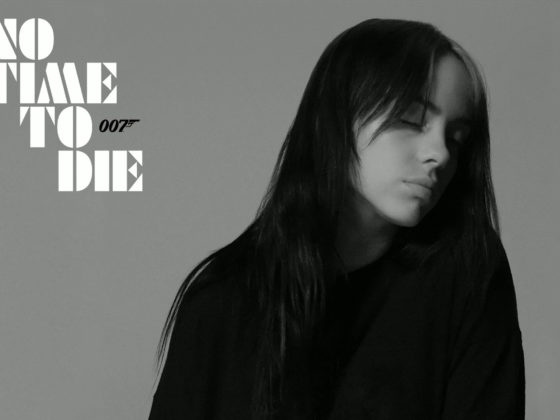From the opening riff, lifted straight from the 1982 songTrue to Life (and surely a wink and nod to the fans), this is Roxy Music’s first album in 28 years. Bryan Ferry has said that he considered making Olympia an official Roxy record, but felt the material was more suited for a solo album. Perhaps, but all original members of Roxy Music are present, including Brian Eno, Phil Manzanera, Andy Mackay, and Paul Thompson.
Also, unlike most of Ferry’s solo albums, which feature the artist on the cover, Olympia follows Roxy Music’s tradition of featuring beautiful models. From the glamour-girl pin-up of the eponymous first album and the Newtonesque photo of Amanda Lear’s vamp on For Your Pleasure, to the ripped-bodice romance and soft-porn suggestiveness of Stranded and Country Life, the Roxy Music album covers are a more suitable thematic background for the Olympia cover, which features supermodel Kate Moss. As evidence that this is really a Roxy Music album, the cover argument backfires, because…well, it says Bryan Ferry right there. See?
What’s more interesting though, is how the cover photo sets the tone for the music contained within. Mr. Ferry goes to great length in the liner notes to explain the artistic inspiration of the album title and cover photo, which turns-out to be a Manet painting of the same name. But even after four paragraphs of conceptual justification, photographs of Ferry seeking inspiration from art books, and a documentary of the photo shoot itself, the end result is that most people will see the album cover as just another perfume ad lifted from the pages of Vanity Fair. It might as well say “Olympia…by Bryan Ferry.” It’s slick sheen confounds and betrays the thought that went behind it.
This has always been the case with Ferry’s music, as well. He spends years developing ideas and crafting songs that are burnished to such a high gloss upon their eventual fruition, that most casual listeners only hear soulless pop pap packaged to sell premium vodka and Cadillacs. Only those willing to hold the crystal up to the light and peer within to see the unique bubbles, cracks, and imperfections are rewarded with something more.
Ferry’s voice has aged well, like port from an oak cask. It’s darker, mellower. Ferry calls it “more experience(d).” It isn’t as strong, though, and I found it buried just a bit too far into the mix for my liking. But there is a gravity to it and when the 65-year-old crooner sings about “the evening of your years” he has my ear. I want to hear what he has to say.
Lyrically, Ferry treads familiar ground, exploring the pain of lost love without ever becoming desperate or cynical. He knows that even one blissful night with an infatuation is worth the eventual heartache. In fact, the album plays as a soundtrack to a story that begins with an aging lounge lizard singing to revelers 40 years his junior (as in the video for You Can Dance), asking “Do you want to play?” and finally ending with our man slumped in a chair after the after-party, smoldering cigarette in hand, left alone with his thoughts. In the anthem Heartache by Numbers, he is heartbroken and longs for things to be different (“Every night I run around with every girl in town / I would rather stay at home, if you were still around”), but without any regrets (“I would do it all again”). On my favorite track, he lays it out simply “No reason or rhyme, by chance or design / Just a dance to the music of time.”

Along with the members of Roxy Music, there is an impressive guest-list of musicians on this record: Dave Stewart (Eurythmics), David Gilmour (Pink Floyd), Nile Rodgers (Chic), Flea (Red Hot Chili Peppers), Jonny Greenwood (Radiohead), Groove Armada, Scissor Sisters, Marcus Miller, and Steve Nieve. There are a couple of groovy dance tracks (You Can Dance, Shameless) and a stripped-down ballad (Tender is the Night), but most of the other songs are the smooth, lounge-rock we have come to expect from Ferry. As can also be expected, there are two covers – Traffic’s No Face, No Name, No Number and a beautiful rendition of Tim Buckley’s Song to the Siren, which is one of the highlights of the album and another possible nod to the days of Roxy past and their album Siren, the cover of which featured Ferry’s then-lover Jerry Hall as the siren. This is only speculation on my part, but it wouldn’t be the first time that Ferry has sent a message to Hall on one of his solo albums, the last time being Kiss and Tell from 1987’s Bête Noire.
Olympia isn’t Ferry’s best, but it is the best he has done in 20 years. With a catalog back-loaded with albums of cover songs (good as they may be), this effort comes across as relaxed and more confident. It’s densely layered, but never too busy. It’s fussed-over, but still restrained. It’s good enough for a younger generation to hopefully discover this oft-cited inspiration and influence for so many acts over the last several decades. For fans, it’s a must have. Until an official Roxy Music record is released, this will get you through the night.

Please pin, tweet, and share! Most importantly, let me know what you think in the comments below.









